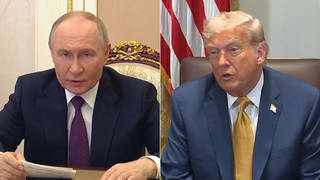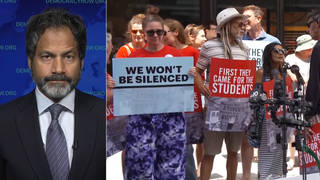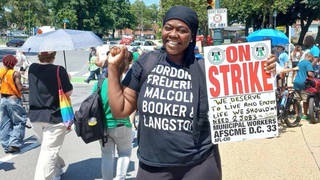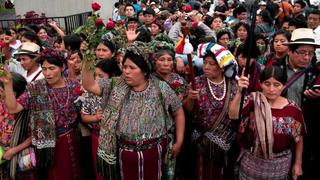
Topics
Guests
- Cassandra SmithiesSpanish translator.
- Rigoberta Menchúis largely responsible for making sure Ríos Montt was brought to justice. She began the process over a decade ago with legal cases filed against Guatemalan generals for atrocities in the Mayan region. In 1992, Menchú was awarded the Nobel Peace Prize. She has published many books, including I, Rigoberta Menchú: An Indian Woman in Guatemala.
Days after Guatemala’s former U.S.-backed dictator, Efraín Ríos Montt, was convicted of genocide, we’re joined by a woman largely responsible for making sure he was brought to justice. Rigoberta Menchú began the process over a decade ago with legal cases filed against Guatemalan generals for atrocities committed in the Mayan region. Her lawsuits helped culminate last week in Ríos Montt’s landmark guilty verdict and 80-year sentence for his role in the killings of more than 1,700 Ixil Mayan people. Menchú lost her father, mother and two brothers during the Guatemalan genocide, later winning the Nobel Peace Prize for her campaigning on behalf of Guatemala’s indigenous population. “The conviction of Ríos Montt may provide an opportunity to close a chapter of our lives, a chapter of profound pain, [allowing] us to begin a new relationship amongst Guatemalans,” Menchú says. “Because during the genocide, we felt so alone, we felt powerless, and we felt that nobody had our back. … The fact the genocide was committed is [now] recognized means that nobody will ever forget.”
Transcript
NERMEEN SHAIKH: We turn now to Guatemala. The country’s former dictator, Efrain Ríos Montt, is spending a second day at a military hospital after fainting en route to a court hearing. Prison authorities say a judge will decide when 86-year-old Ríos Montt must return to prison.
Last week, Ríos Montt became the first former head of state to be found guilty of genocide in his or her own country. The former dictator was jailed Friday to begin an 80-year sentence for genocide and crimes against humanity for his role in the killings of more than 1,700 Ixil Mayan people after he seized power in 1982.
Ríos Montt was a close ally of the United States. Former President Ronald Reagan once called him, quote, “a man of great personal integrity.”
After the verdict, Judge Yassmin Barrios ordered the attorney general to launch an immediate investigation of, quote, “all others” connected to the crimes.
JUDGE YASSMIN BARRIOS: [translated] In continuation of the investigation on the part of the public ministry, the tribunal orders the public ministry to continue the investigation against more people who could have participated in the acts which are being judged.
AMY GOODMAN: One former general implicated in abuses during the trial was Guatemala’s current president, Otto Pérez Molina. In the early '80s, Pérez Molina was a military field commander in the Ixil region where the genocide occurred. At the time, he was operating under the alias “Major Tito Arias.” During the trial, one former army officer accused him of participating in executions. It remains yet to be seen if he'll also be tried for crimes of genocide.
Well, today we’re going to Mexico City to be joined by a woman largely responsible for making sure that Ríos Montt was brought to justice. She began the process over a decade ago with legal cases filed against Guatemalan generals for atrocities in the Mayan region. Her name is Rigoberta Menchú. She’s the winner of the Nobel Peace Prize. She has published many books, including I, Rigoberta Menchú: An Indian Woman in Guatemala. She’s been translated into many languages, awarded more than 30 honorary degrees, and runs the Rigoberta Menchú Tum Foundation.
We’re also joined by Allan Nairn. He was due to be a witness in the trial and covered Guatemala extensively in the early ’80s. He attended the trial.
Rigoberta Menchú and Allan Nairn, we welcome you to Democracy Now! Let’s start in Mexico City. Rigoberta Menchú, your response to the verdict and the 80-year sentence of Ríos Montt?
RIGOBERTA MENCHÚ: [translated] Thank you, Amy Goodman. Thank you for this opportunity. I want to express my condolences to the victims of Boston and Pennsylvania. I am here with you today.
This verdict is historic. It’s monumental. The verdict against Ríos Montt is historic. We waited for 33 years for justice to prevail. It’s clear that there is no peace without justice. There is no peace without truth. We need justice for the victims for there to be real peace. This verdict is crucial. It complements a long process of investigation, of denouncing the abuses, and a process that the victims hope will heal and result in reparations. So this verdict isn’t just about asking somebody to say they’re sorry. It is important to apologize, and President Otto Pérez Molina has to apologize. And the court will move in that direction. President Otto Pérez Molina must apologize, and the court has instructed him to do so.
NERMEEN SHAIKH: Rigoberta Menchú, do you believe President Molina should resign?
RIGOBERTA MENCHÚ: [translated] Not just that alone does not suffice.
NERMEEN SHAIKH: Do you believe, Rigoberta Menchú, that President Molina should resign?
RIGOBERTA MENCHÚ: [translated] Well, I would prefer not to embark on that debate. The most important thing is to understand the verdict for genocide as part of a larger process, and I am confident that there will be more trials. And if there are other high command officers who are responsible, I am confident that they will be brought to justice and the abuses will continue to be denounced and that justice will prevail in those cases, as well.
But in this case, a very important precedent has been set by this verdict. I am sure that Mr. Mauricio, who was the head of military intelligence and who was also part of the team of Ríos Montt, was absolved. And we thought that he should have also been convicted for genocide because he knew what was going on. So, this verdict shows that, on one hand, that Ríos Montt should be convicted for genocide, on very clear criterias, and he certainly was responsible for the genocide in Guatemala, but there are other high officials implicated in the genocide.
And the most important thing is that this verdict be respected and the court respected, and that the verdict and sentence be fulfilled, and that the court be fully respected, and that Judge Yassmin Barrios’ life be protected and all of the witnesses and victims, because a lot of people who are responsible for genocide are still free, and they are very aggressive, because they said that the victims were communists and subversives, and that’s why they deserved to be exterminated. And they accused the court and the judge of being communists, as well. And so, that shows that very little has really changed in Guatemala. So, we’re no longer in the Cold War, but certainly the rhetoric smacks of Cold War rhetoric. So this is a very delicate moment in Guatemala, and the most important thing is not to take a step backwards.
For me, there are four important reasons why we need to demand that the sentence be served, the verdict that was handed down on May 10th. First of all, this is a precedent and the first president in the whole world where a verdict has been handed down for genocide of a head of state in the country where it in fact occurred.
Secondly, this conviction for genocide proves that the victims spoke truth. For 32 years, victims have been seeking justice and have been documenting the abuses and suffering attacks by those who are responsible for genocide. They were. And we were accused of being liars. They said that we invented things, and they turned their back on us, and we were not supported by them. The hatred against the Mayans and the victims of the genocide is very—a tangible history in the last 32 years in Guatemala. So, justice has prevailed, though it sure took its time. But justice is prevailing, and the most important thing is that the sentence be served and the verdict respected.
The third crucial element has to do with the region that the genocide was committed in against the Ixil people, you know, that there were 200,000 victims of the genocide in Guatemala. There are 50,000 people who were disappeared. And there are victims throughout the country, not just in the region that was addressed in the trial. And so, in this regard, we are all Ixils. We identify fully with them, because we all suffered genocide as Mayans. And we need to remember that the policy of extermination and genocide against Mayans was also a policy of extermination of non-Mayans, as well. Unionists, student leaders also suffered. So, the genocide was by no means limited to the region of the territory of the Ixil people. So this is a crucial legal precedent for our country, and I think it can serve as the cornerstone for a new relationship amongst Guatemalans.
And I want to stress something that we have been saying for years. We have the International Criminal Court, but this International Criminal Court has not convicted genocide that has been committed. It’s waiting for new cases. It’s not retroactive. It doesn’t address those cases that were committed before the court was created. So the statute of limitations on the International Criminal Court should be lifted. So, this case really represents a—it poses a tremendous challenge to humanity. It’s a challenge for all countries who have allowed for genocide to occur in Guatemala.
AMY GOODMAN: We’re going to break—
RIGOBERTA MENCHÚ: [translated] I don’t want to be controversial, but I do see that under Ronald Reagan and Bush’s administration there was a fantasy created of a third World War. And this fantasy really damaged the mentality of the military in Guatemala and Guatemalan fascists, and they still believe that communism exists. I don’t know what they’re referring to, but the truth is that here in Guatemala, women were raped, girls were raped, they strangled children, they assassinated and wiped out entire indigenous peoples, just because they thought they were so-called subversives and communists. So humanity really has to look into what occurred.
AMY GOODMAN: We’re going to break and then come back to our discussion with Rigoberta Menchú, Nobel Peace laureate. She has just flown from attending the trial in Guatemala City to Mexico City, where we’re speaking to her, and we’ll be joined by investigative journalist Allan Nairn. This is Democracy Now! We’ll be back in a minute.
[break]
AMY GOODMAN: Our guest in Mexico City is the Nobel Peace Laureate Rigoberta Menchú. It was her lawsuit that helped to lead to the conviction—first trial, then conviction and 80-year sentence of the former U.S.-backed dictator of Guatemala, Efraín Ríos Montt. He began his sentence on Friday night, after the sentence was read. Rigoberta Menchú, can you describe what happened to your own father?
RIGOBERTA MENCHÚ: [translated] Yes. Yes, well, as you know, the conviction of Ríos Montt has awakened the suffering that we carry, and we’re going to always feel that suffering as victims. In the case of my own family, my brother Patrocinio was burnt to death in the Ixil region. We never found his remains. We have looked for them. He may be on a farm that’s called the San Francisco Ranch, and he’s probably just in one of the mass graves.
As for my mother, we never found her remains, either. We don’t know if she was buried in a mass grave or eaten by wild animals. If it wasn’t her remains that were eaten by wild animals after having been tortured brutally and humiliated, then her remains are probably in a mass grave close to the Ixil region, because the truth is my family comes from an area very close to Ixil, even though we speak another language, which is Mayan Quiché.
My father was also burned alive in the embassy of Spain in January 30th, 1980. So this is why I feel the suffering of the victims who are clamoring for justice in the case against Ríos Montt, because under Lucas García, right before the coup d’état led by Ríos Montt, they burnt down the Spanish embassy where [my] father was. So, all of the abuses and violations that happened in 1982 and 1983, I suffered personally. My father had recently been burned alive. His name was Vicente Menchú.
So, in '83, my brother Victor was also shot dead. His name was Victor Menchú. He was killed, murdered in Uspantán, also very close to the Ixil region. He was captured by the army. He had fled with his three children to the rainforest. His wife had her throat slit, and he was fleeing with his three children. After a couple of months, they captured him and took him to Uspantán. And Victor was jailed in the little town, but his three children were kept in a military bunker. It was called Chajul, this bunker. So my two nieces died of hunger in this military base, and my brother Victor was shot. We still have not found the remains of Victor. We found a file about his cadaver being found with multiple gunshot wounds in the place where people say he was probably shot, but a judge who ruled on his death drew up a death certificate, but it doesn't specify where he was murdered. So we think that my brother Victor is also buried in a mass grave.
And these are the people closest to me who were murdered during the genocide. My father, my mother, my brother Victor, my brother Patrocinio and my sister-in-law Maria were the closest members of my family affected by the genocide.
And this is why I think that the conviction of Ríos Montt may provide an opportunity to close a chapter of our lives, a chapter of profound pain and a chapter that closes and allows us to begin a new relationship amongst Guatemalans, because during the genocide, we felt so alone, we felt powerless, and we felt that nobody had our back. But now a court has convicted Ríos Montt of genocide. So, for us, that suffices, that the fact that genocide was committed is recognized means that nobody will ever forget that genocide was committed.













Media Options